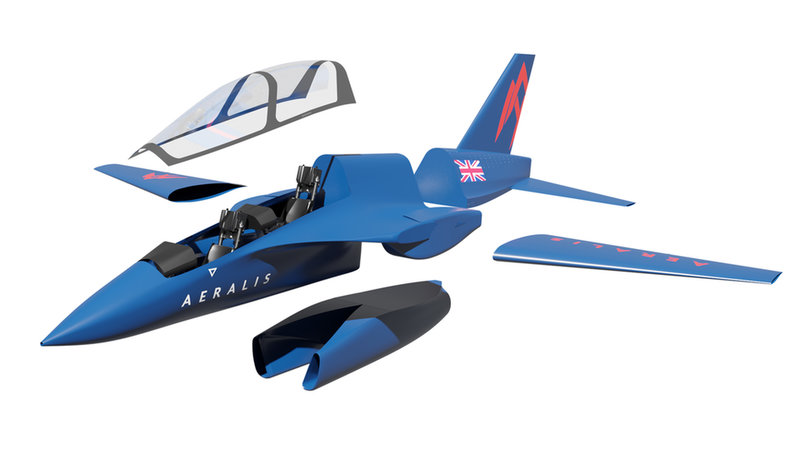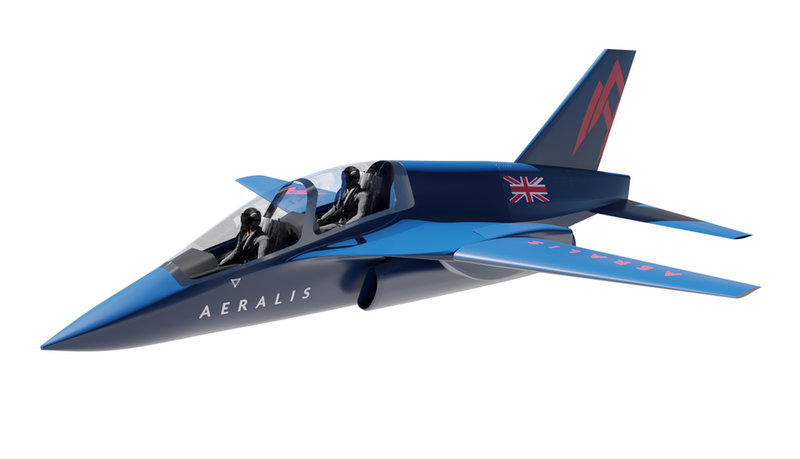AIR
Q&A: Aeralis on the future for modular jets
UK-based jet aircraft developer Aeralis has been awarded a three-year contract by the Royal Air Force’s Rapid Capabilities Office (RCO) for further research and development of its modular jet design. Harry Lye talks to Aeralis CEO Tristan Crawford about the advantages of its modular jet design and the company’s place in the aerospace market.
Harry Lye:
What inspired the approach to develop a modular aircraft?
Tristan Crawford:
The inspiration behind Aeralis was twofold. Modular aircraft have been a feature of the commercial aviation industry for decades, and the benefits of modular systems are plain to see in terms of cost and time savings.
Having seen the way this was applied and developed in my time at Airbus, I was intrigued as to why the military had not taken a modular approach to light jet aircraft design and manufacture despite the obvious reduction in procurement and maintenance costs, especially as we are seeing a more modular approach to land vehicle and naval systems in the military, many of which are designed with open architecture in mind.
We saw the incredible opportunity and wanted to seize the chance to develop an innovative and flexible aircraft.
The second thing which inspired Aeralis was that we have an opportunity to develop an aircraft that is 100% British. The last time Britain developed its very own military aircraft was with the Hawk in 1974 and we haven’t made a single 100% British military aircraft since, despite the fact that we have all of the infrastructure and technology necessary.
We want Aeralis to capitalise on this wealth of resources to create the first fully British military aircraft in almost 50 years.

// DSEI space advisor Dr Michael Holden
Speaking of his new appointment, Holden says: “DSEI wanted to grow the Space Hub in 2021. They already have a great team who understand the stakeholders in the space community; they understand the military context of space and they understand the fundamental issues around space. They brought me in with a sole focus on space to look at how DSEI's output can represent the space community better.”
Holden is helping the team put together a programme for 2021 that will include events before, during and after the show in September. It will take advantage of all domains being represented at the show to support the current strategic focus on cross-domain, multi-domain and integrated operations.
“We're working with the teams from the other domains within DSEI, particularly land, sea and cyber – cyber is a separate hub in DSEI – to show that we develop a coherent approach to demonstrate the criticality of multi-domain or integrated operations at the show,” he explains.
DSEI is also working closely with the Ministry of Defence and the wider UK Government as they formulate the National Space strategy, due for publication in the second quarter of 2021.


// Image: The company’s design features a common core fuselage with different wings and engines tailoring the aircraft for different roles. Credit: Aeralis
What benefits does the modular approach offer compared with traditional aircraft?
The Aeralis aircraft is the world’s first fully modular military light jet aircraft and streamlines the design, development and in-service support processes for military aircraft across multiple training and supporting combat roles. It will have the potential to deliver significant cost savings due to rationalisation of aircraft types and help to reduce the complexity and costs of acquisition and sustainment when compared with more traditional approaches.
Having aircraft variants designed and built using 85% common systems and spares, flown by students and pilots using common cockpits and supported with a single procurement and integrated logistic supply system, will drastically accelerate training and pilot currency while also significantly rationalising the enormous cost-base of operating military jet aircraft.
Independently validated studies suggest a typical air force would see a 30% decrease in through-life cost for flying training alone, with the ability to reduce the number of aircraft types an air force uses by up to 40%.
Given the ability for the jets to be configured as a wide range of ancillary combat as well as trainer variants, Aeralis forecasts a very significant upside market for well in excess of 600 aircraft over 20 years.
There are estimates that we've got something like four to five times the level of private investment in space capabilities than we do in government, which is a huge turnaround from a decade ago.
How will the RAF RCO contract help push the concept further?
The contract with the Rapid Capabilities Office is a big step for us as it means we now have major UK support for the requirements and design review process. The contract is also a signifier of the confidence placed in Aeralis by Air Commodore Jez Holmes of the RAF.
Together with support from Air Marshal Andy Turner and Air Marshal Rich Knighton of the MOD, he believes in the potential that Aeralis has to redefine the ways in which we approach the development of military aircraft to break the ‘cost curve of military aircraft development whilst advancing their ambitions of rationalising the RAF’s future fleet.
It is also worth mentioning that the RAF’s confidence will make Aeralis well-placed to benefit from further government support and private sector funding, yielding a closer working relationship with the MOD. Here at Aeralis, we are absolutely delighted to have had such close support from the MOD and RAF and is ultimately the ‘spiritual home’ from which we wish to develop the Aeralis concept.
What benefits would an Aeralis fleet offer the RAF?
One of the biggest benefits will be the cost and time savings associated with the modular aircraft. With a 30% decrease in through-life costs for the trainers, more time and money can be dedicated to research and innovation, upon which a huge emphasis has been placed in the Integrated Review.
The procurement and maintenance costs of an Aeralis fleet will be far lower due to fewer aircraft types and greater flexibility in the aircraft the RAF can use. This will free up more funds for research and innovation.
Aeralis will also allow the RAF to change the paradigm surrounding the procurement of aircraft, for both rationalising the burden of procuring several types of different aircraft and reducing risk by removing dependence on complicated international supply chains.
The UK has the ability to produce every single Aeralis component, from the wings to the engines, to the systems and avionics, meaning the RAF could rely on an aircraft built using a 100% UK-based supply chain, which would be agile and resilient and help mitigate the risk factors of associated with competing aircraft having to source components mostly internationally.
How does Aeralis see itself fitting into the wider aerospace market?
Aeralis’s strategy is to ‘design in the UK, build globally, optimise locally’ so that the aircraft system, whilst a product of UK design & manufacture, can still meet the needs of the global market.
There are numerous credible markets that need small jets, and Aeralis offers an excellent opportunity for the UK to pursue them and use the modular build of the aircraft to support local capability in export markets.
In recent years the UK has fallen behind countries such as South Korea and Italy, which have been able to develop small trainer jets to meet legacy demand. Aeralis, however, offers a new opportunity for the reinvigoration of the UK’s whole military aircraft design, development and manufacturing industry, contributing towards the UK’s prosperity agenda and the Government’s goal to promote British innovation across the globe.
Aeralis has tremendous export potential given that its modularity will enable air forces around the world to re-configure rather than replace aircraft, delivering capability using a range of configurations in multiple roles, streamlining procurement, support and operation of their fleets.
Many air forces will need to update their fleets in the coming years, and Aeralis has been designed with the scope to provide a solution to this. This is why we believe Aeralis is the future of Air Force fleets.
// Main image: The RAF recently awarded Aeralis a contract to develop its modular aircraft. Credit: Aeralis